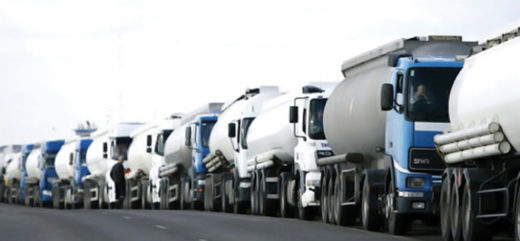
The Amalgamation of Truck Owners in the Maritime Industry on Wednesday commended the Nigerian Navy for the steps it took in addressing gridlocks in Apapa area of Lagos.
The organisation’s Publicity Secretary, Oluwaseyi Taiwo, told the News Agency of Nigeria (NAN) in Lagos that the action had restored sanity and brought great relief to residents and motorists.
The Commanding officer, Nigerian Navy Ship (NNS) BEECROFT, Commodore Okon Eyo, had in March issued a 48-hour ultimatum to truck drivers to vacate the roads and bridges leading to Apapa port.
As part of measures to end the gridlock, the Nigerian Navy introduced a “Call up Card System’’ for the trucks loading at Apapa ports.
The call up card system allowed only trucks that had business inside the port, while those without call up cards were turned back at the foot of the bridge.
In commending the efforts of the Navy, Taiwo said that the order had prevented mischief makers from taken advantage of the chaotic traffic situation.
“We hereby commend the intervention of the navy which made the impossible to be possible that such respite can come within a week.
“Although the intervention may not be a permanent one, yet, it is a big relief to the road infrastructure in the state.
“The intervention is also a relief to everyone, but it is not over yet as there is still room for improvement.
“I am also commending everyone that contributed to the compliance – the police, LASTMA and others – for bringing sanity to Apapa and its environs,’’ he said.
Taiwo recalled that the indiscriminate parking by trucks started during the 2006 Port Reform when trucks were pushed out of their designated parks inside the Apapa Port.
“Apapa port used to have parking lots for trucks – Trailer Park A, B, C, D and E, – but were taken over during the concession exercise, and the Tin Can Island Port also has its own.
“Now, without a provision for trucks to have a transit point, they are pushed to the streets. And considering the density of the ports too, things became complicated,” he said.
Taiwo urged the government to look beyond the temporary solution to a permanent one by providing truck parks and automated loading system for truck owners.
“Eighty to ninety per cent of the trucks coming to Lagos State have their own parks outside the state, but getting to Lagos, they need a place to park, like a transit park.
“There should be a provision for a parking place for those coming into Lagos to park their trucks; this will discourage parking on the roads.
“Also there should be an automated loading system that will serve as call up system to inform the truckers when they have their appointment to load.
“In this age of GSM, things should be easier and people should be able to access their loading time through automation, this will reduce stress on the drivers too,’’ he said.
Taiwo also called on the government to repair roads leading to the port, adding that many drivers were frustrated due to stress they encountered on the roads.
“Frustration can lead to anything, so we are also advising government to consider repairing the roads which are the gateway to the nation’s economy,” he said.
He added that the union had in the past purchased some landed properties with the aim of converting them to Transit Park, among other efforts.
“We on our own part have not left the issue of getting a place for our trucks to park to government alone; we have purchased land around the ports.
He said that the organization was awaiting government’s approval on the purchase of a land in Orile area which could accommodate about 2,000 trucks.
“We also identified another property along Orile/Coker that can take about 1,300 trucks, the place is almost ready and the owner wants outright purchase which we have sent a covering letter to the government.
“We are yet to get approval up till now because of the bureaucracy,’’ he said.
Also speaking, Mrs Folake George, President, Corporate Fleet Owners Association, urged the Nigerian Ports Authority (NPA) to stop shipping companies from bringing empty containers to the port.
“Aside the intervention by the naval command, NPA should mandate shipping company not to bring empty containers directly to the port again.
“The containers should be taken to the container holding bay from where it will be transported to the port where they have the vessels that will take them to the terminals,’’ she said.
END

Be the first to comment